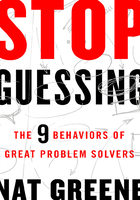
LET’S SOLVE SOME HARD PROBLEMS
First, let me clarify what kinds of problems you’re going to be solving. When I say “practical problems” I mean problems in systems or processes, man-made or natural. I don’t mean problems of philosophy, such as “what is love?” I don’t simply mean complex decisions, and I don’t mean problems of innovation or strategy. I’m referring to problems in which a system or process is operating in a way that we don’t want it to, and our lives will be better if the problematic behavior is solved. These problems might include a stubborn waistline, a computer that shuts down intermittently, a public policy that is not achieving its intended goal, or a troublesome relationship.
An easy problem might be one where your car suddenly starts coasting to a stop, and you hear the engine sputtering. Turns out you were too wrapped up in the latest podcast to notice that your fuel gauge was empty, so you need to get fuel for the car. The vast majority of problems are like this. You use methods you’re used to: You use your experience and intuition, and you guess. Because most problems are easy, one of your guesses is often right, and so this approach is practical and efficient. But what happens when you’ve tried the quick, obvious things that come to mind, and you still haven’t solved the problem?
A hard problem is one where the solution is deeply hidden or obscure. These problems tend to exist in more complex systems or processes, and have often stubbornly resisted previous attempts to solve them. Our conventional approaches to solving easy problems do not work for solving hard ones.
Some examples of hard problems that I’ll discuss in this book include a failing chemical processor that cost hundreds of millions of dollars, a losing baseball team without the budget for star players, and the scourge of poverty in sub-Saharan Africa. These hard problems can be tedious to illustrate in fine detail, so I’ll cover them briefly in the book. (For those interested, you can view more detailed case studies of these problems at www.stopguessingbook.com.)
The examples are mostly from my personal experience, along with a few that I have read about, so they’ll be weighted heavily to problems I encounter as a consultant in industry, the problems I have run into around my house, and those I deal with as a friend, a husband, and as a father. I believe strongly that these same behaviors can be applied to problems of almost any kind, and I have seen evidence of the behaviors working well in other hard problems that people have solved around the world. But in order to be accurate and clear, I will stick primarily to the examples I know best.